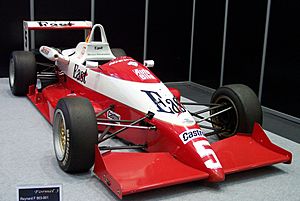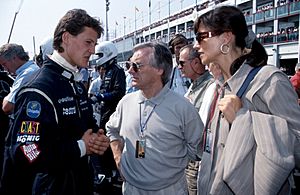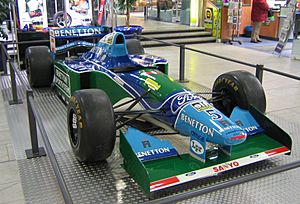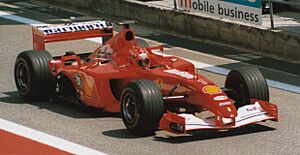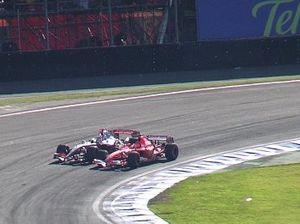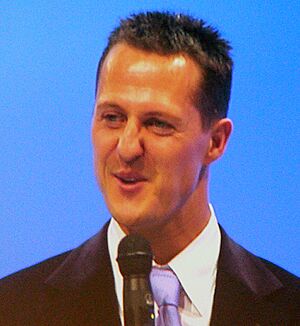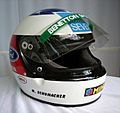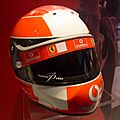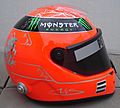Michael Schumacher facts for kids
Quick facts for kids
Michael Schumacher
|
|
|---|---|

Schumacher at the 1998 Italian Grand Prix
|
|
| Born | 3 January 1969 Hürth, North Rhine-Westphalia, West Germany
|
| Spouse(s) |
Corinna Betsch
(m. 1995) |
| Children | 2, including Mick |
| Relatives |
|
| Awards | Full list |
| Formula One World Championship career | |
| Nationality | |
| Active years | 1991–2006, 2010–2012 |
| Teams | Jordan, Benetton, Ferrari, Mercedes |
| Entries | 308 (306 starts) |
| Championships | 7 (1994, 1995, 2000, 2001, 2002, 2003, 2004) |
| Wins | 91 |
| Podiums | 155 |
| Career points | 1566 |
| Pole positions | 68 |
| Fastest laps | 77 |
| First entry | 1991 Belgian Grand Prix |
| First win | 1992 Belgian Grand Prix |
| Last win | 2006 Chinese Grand Prix |
| Last entry | 2012 Brazilian Grand Prix |
| 24 Hours of Le Mans career | |
| Years | 1991 |
| Teams | Sauber |
| Best finish | 5th (1991) |
| Class wins | 0 |
| Signature | |
 |
|
Michael Schumacher (born 3 January 1969) is a German former racing driver who raced in Formula One from 1991 to 2006 and from 2010 to 2012. He is considered one of the greatest drivers in the history of the sport.
Schumacher won seven Formula One World Drivers' Championship titles, a record he shares with Lewis Hamilton. When he first retired in 2006, he held the records for the most wins (91), pole positions (68), and podium finishes (155). He still holds the record for the most fastest laps (77).
Contents
Early Life and Racing Beginnings
Michael Schumacher was born in Hürth, West Germany. His father, Rolf, was a bricklayer who also ran the local go-kart track. His mother, Elisabeth, worked at the track's canteen.
When Michael was four years old, his father put a small motorcycle engine on his pedal kart. After Michael crashed it, his parents took him to the local karting track, where he became the youngest member of the club. At age six, he won his first club championship. His parents worked hard to support his racing dream.
Schumacher was very successful in karting. By 1987, he was the German and European Kart Champion. After his success in karts, he moved on to racing single-seat cars in series like Formula Ford and Formula Three. In 1990, he won the German Formula Three Championship.
Formula One Career
Schumacher's amazing talent quickly got him noticed, and he soon made it to Formula One, the highest level of motorsport.
Jordan and Benetton (1991–1995)
Schumacher made his Formula One debut in 1991 at the Belgian Grand Prix with the Jordan team. Even though he had never driven on the difficult Spa-Francorchamps track before, he amazed everyone by qualifying in seventh place. Unfortunately, his car broke down on the first lap of the race.
His performance was so impressive that the Benetton team signed him immediately. In 1992, he won his first ever Formula One race, again at the Belgian Grand Prix.
First Two Championships
In 1994, Schumacher won his first World Drivers' Championship with Benetton. The season ended with a controversial crash between him and his main rival, Damon Hill, at the last race in Australia. The crash put both drivers out of the race, which meant Schumacher won the title by just one point.
In 1995, he defended his title, winning his second championship. He won nine races that season and helped Benetton win its first and only Constructors' Championship. At the time, he was the youngest two-time World Champion in F1 history.
Ferrari (1996–2006)
In 1996, Schumacher made a big move to Ferrari. The famous Italian team had not won a drivers' championship since 1979 and was struggling. Schumacher took on the challenge of rebuilding the team.
The first few years were difficult. In 1996, he won three races, including a famous victory in the rain at the Spanish Grand Prix. In 1997, he fought for the title with Jacques Villeneuve. In the final race, the two drivers collided. Schumacher had to retire, and Villeneuve became champion. Schumacher was later disqualified from the 1997 championship for his part in the crash.
Five Championships in a Row
After years of hard work, Schumacher and Ferrari's efforts paid off. From 2000 to 2004, they dominated Formula One. Schumacher won five consecutive World Championships, a record that has never been broken.
- 2000: He won his first title with Ferrari after a close battle with his rival Mika Häkkinen. It was Ferrari's first drivers' title in 21 years.
- 2001: He won his fourth title easily, with four races still left in the season.
- 2002: This was one of his most dominant seasons. He finished on the podium in every single race (17 out of 17) and won the championship earlier than any driver in history.
- 2003: He won his sixth title, breaking the record of five championships held by Juan Manuel Fangio.
- 2004: He won his seventh and final championship, winning 13 of the 18 races that season, which was a new record.
Final Years at Ferrari and First Retirement
After 2004, rule changes made it harder for Ferrari to win. In 2006, after a close fight for the championship with Fernando Alonso, Schumacher announced he would retire from racing.
In his last race for Ferrari at the Brazilian Grand Prix, he had a tyre problem early on that dropped him to the back of the field. He then drove an amazing race, overtaking many cars to finish in fourth place. It was a performance that many people said summed up his incredible career.
Mercedes (2010–2012)
After three years away from racing, Schumacher made a surprise comeback in 2010 with the new Mercedes team. He was 41 years old.
His return was not as successful as his first career. The car was not as competitive, and he did not win any races. However, he did achieve one more podium finish at the 2012 European Grand Prix.
Many people believe his work during these years helped lay the foundation for the Mercedes team's later success with drivers like Lewis Hamilton and Nico Rosberg. Schumacher retired for a second and final time at the end of the 2012 season.
Driving Style and Legacy
Schumacher was known for his incredible speed, his ability to push the car to its limits for many laps, and his amazing skill in wet weather, which earned him the nickname Regenkönig (Rain King).
He was also famous for his dedication and fitness. He worked very hard with his engineers to make the car better and was known for being a great team leader. He helped turn Ferrari from a struggling team into the most successful team in F1 history.
Schumacher's success made Formula One extremely popular in his home country of Germany and inspired a new generation of German drivers, including four-time champion Sebastian Vettel. When he retired, he held most of the important records in the sport.
Personal Life
In 1995, Michael married Corinna Betsch. They have two children, a daughter, Gina-Maria, and a son, Mick Schumacher, who also became a Formula One driver. Schumacher has always been a very private person and preferred to keep his family life out of the spotlight.
2013 Skiing Accident
On December 29, 2013, Michael Schumacher had a serious skiing accident in the French Alps. He suffered a severe head injury, even though he was wearing a helmet. He was placed in a medically induced coma to help him recover.
Since the accident, his family has chosen to keep his health condition private to protect him. He has not appeared in public since the accident.
Interesting facts about Michael Schumacher
- Schumacher helped create the first lightweight carbon fiber racing helmet. This helmet was so strong that a prototype survived being driven over by a tank! It also kept drivers cool with special airflow.
- For special races, he wore unique helmets. For example, he had an all-red helmet listing his 91 wins. For his 20th anniversary in Formula One, he wore a gold-leafed helmet.
- Schumacher trained for hours every day to strengthen his neck muscles. This helped him handle the strong forces during races.
- He was amazing in wet weather, earning him nicknames like "Rain King" (Regenkönig).
- His red Ferrari also led to the nickname "the Red Baron."
- Michael used his fame to help many people. He donated over $50 million to various charities between 2002 and 2006.
- He was a special ambassador for UNESCO. He donated a lot of money to build schools for children in need. He also supported hospitals and centers for homeless children.
Michael Schumacher quotes
- "Once something is a passion, the motivation is there."
- "I always thought records were there to be broken."
- "Sometimes minor details can have a huge impact. If you don't devote 100 percent of your efforts to every detail, you immediately run into difficulties."
- "First, you have to finish."
Awards and Recognitions
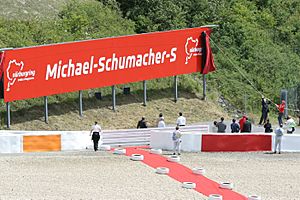
Michael Schumacher received many awards for his amazing career.
- In 1997, he received Germany's highest sports award, the Silbernes Lorbeerblatt.
- In 2002 and 2004, he won the Laureus World Sportsman of the Year award.
- He was named a UNESCO Champion for Sport in 2002 for helping children's education.
- In 2006, football legend Pelé gave him a "Lifetime Achievement Award."
- He won the Race of Champions Nations' Cup six times with Sebastian Vettel.
- In 2017, he was added to the FIA Hall of Fame.
- Streets and corners on race tracks, like the Nürburgring and Bahrain International Circuit, were named after him.
- He also received honorary citizenship from several cities.
Racing Records
Career Summary
| Season | Series | Team | Races | Wins | Poles | F/Laps | Podiums | Points | Position |
|---|---|---|---|---|---|---|---|---|---|
| 1988 | European Formula Ford 1600 | Eufra Racing | 4 | 1 | 1 | 0 | 3 | 50 | 2nd |
| German Formula Ford 1600 | 7 | 3 | 0 | 0 | 5 | 124 | 6th | ||
| Formula König | Hoecker Sportwagenservice | 10 | 9 | 1 | 1 | 10 | 192 | 1st | |
| 1989 | German Formula Three | WTS Racing | 12 | 2 | 2 | 0 | 7 | 163 | 3rd |
| FIA European Formula 3 Cup | 1 | 0 | 0 | 0 | 0 | N/A | NC | ||
| Macau Grand Prix | 1 | 0 | 0 | 0 | 0 | N/A | NC | ||
| 1990 | World Sportscar Championship | Team Sauber Mercedes | 3 | 1 | 0 | 1 | 3 | 21 | 5th |
| German Formula Three | WTS Racing | 11 | 5 | 6 | 4 | 7 | 148 | 1st | |
| FIA European Formula 3 Cup | 1 | 0 | 1 | 1 | 0 | N/A | NC | ||
| Macau Grand Prix | 1 | 1 | 0 | 0 | 0 | N/A | 1st | ||
| Deutsche Tourenwagen Meisterschaft | HWA AG | 1 | 0 | 0 | 0 | 0 | 0 | NC | |
| 1991 | Formula One | Team 7UP Jordan | 1 | 0 | 0 | 0 | 0 | 0 | 14th |
| Camel Benetton Ford | 5 | 0 | 0 | 0 | 0 | 4 | |||
| World Sportscar Championship | Team Sauber Mercedes | 8 | 1 | 0 | 2 | 2 | 43 | 9th | |
| Deutsche Tourenwagen Meisterschaft | Zakspeed Racing | 4 | 0 | 0 | 0 | 0 | 0 | NC | |
| Japanese Formula 3000 | Team LeMans | 1 | 0 | 0 | 0 | 1 | 6 | 12th | |
| 1992 | Formula One | Camel Benetton Ford | 16 | 1 | 0 | 2 | 8 | 53 | 3rd |
| 1993 | Formula One | Camel Benetton Ford | 16 | 1 | 0 | 5 | 9 | 52 | 4th |
| 1994 | Formula One | Mild Seven Benetton Ford | 14 | 8 | 6 | 8 | 10 | 92 | 1st |
| 1995 | Formula One | Mild Seven Benetton Renault | 17 | 9 | 4 | 8 | 11 | 102 | 1st |
| 1996 | Formula One | Scuderia Ferrari S.p.A. | 16 | 3 | 4 | 2 | 8 | 59 | 3rd |
| 1997 | Formula One | Scuderia Ferrari Marlboro | 17 | 5 | 3 | 3 | 8 | 78 | DSQ |
| 1998 | Formula One | Scuderia Ferrari Marlboro | 16 | 6 | 3 | 6 | 11 | 86 | 2nd |
| 1999 | Formula One | Scuderia Ferrari Marlboro | 10 | 2 | 3 | 5 | 6 | 44 | 5th |
| 2000 | Formula One | Scuderia Ferrari Marlboro | 17 | 9 | 9 | 2 | 12 | 108 | 1st |
| 2001 | Formula One | Scuderia Ferrari Marlboro | 17 | 9 | 11 | 3 | 14 | 123 | 1st |
| 2002 | Formula One | Scuderia Ferrari Marlboro | 17 | 11 | 7 | 7 | 17 | 144 | 1st |
| 2003 | Formula One | Scuderia Ferrari Marlboro | 16 | 6 | 5 | 5 | 8 | 93 | 1st |
| 2004 | Formula One | Scuderia Ferrari Marlboro | 18 | 13 | 8 | 10 | 15 | 148 | 1st |
| 2005 | Formula One | Scuderia Ferrari Marlboro | 19 | 1 | 1 | 3 | 5 | 62 | 3rd |
| 2006 | Formula One | Scuderia Ferrari Marlboro | 18 | 7 | 4 | 7 | 12 | 121 | 2nd |
| 2010 | Formula One | Mercedes GP Petronas F1 Team | 19 | 0 | 0 | 0 | 0 | 72 | 9th |
| 2011 | Formula One | Mercedes GP Petronas F1 Team | 19 | 0 | 0 | 0 | 0 | 76 | 8th |
| 2012 | Formula One | Mercedes-AMG Petronas F1 Team | 20 | 0 | 0 | 1 | 1 | 49 | 13th |
|
|
|||||||||
Formula One Records
Schumacher holds the following Formula One records:
| Record | Date first achieved | Current record |
|---|---|---|
| Most World Championship titles | 2002 | 7 |
| Most consecutive titles | 2000–2004 | 5 |
| Most races left in the season when becoming World Champion | 2002 | 6 |
| Most consecutive seasons with a win | 1992–2006 | 15 |
| Most wins in a driver's home country | German Grand Prix (1995, 2002, 2004, 2006) European Grand Prix (1995, 2000, 2001, 2004, 2006) |
9 |
| Most wins not starting from pole position | 2002 Australian Grand Prix | 51 |
| Most wins with fastest lap | 2000 Brazilian Grand Prix | 48 |
| Most consecutive top two finishes | 2002 Brazilian Grand Prix – 2002 Japanese Grand Prix | 15 |
| Highest percentage of podium finishes in a season | 2002 | 100% |
| Most consecutive podium finishes | 2001 United States Grand Prix – 2002 Japanese Grand Prix | 19 |
| Most consecutive podium finishes from first race of season | 2002 Australian Grand Prix – 2002 Japanese Grand Prix | 17 |
| Most fastest laps | 2001 Australian Grand Prix | 77 |
| Most fastest laps in a season | 2004 | 10 |
| Most consecutive seasons with a fastest lap | 1992–2006 | 15 |
| Most fastest laps at the same Grand Prix | Spanish Grand Prix (1993, 1994, 1996, 1999, 2001, 2002, 2004) | 7 |
| Most fastest laps at the same circuit | Barcelona-Catalunya (1993, 1994, 1996, 1999, 2001, 2002, 2004) | 7 |
| Most fastest laps in a driver's home country | German Grand Prix (1993, 1995, 2002, 2006, 2012) European Grand Prix (1995, 2000, 2002, 2004, 2006) |
10 |
| Most hat-tricks (pole, win, and fastest lap) | 2002 Japanese Grand Prix | 22 |
Images for kids
See also
 In Spanish: Michael Schumacher para niños
In Spanish: Michael Schumacher para niños
- 15761 Schumi
- Formula One drivers from Germany
- Häkkinen–Schumacher rivalry
- Hill–Schumacher rivalry
- List of career achievements by Michael Schumacher
- Schumacher


